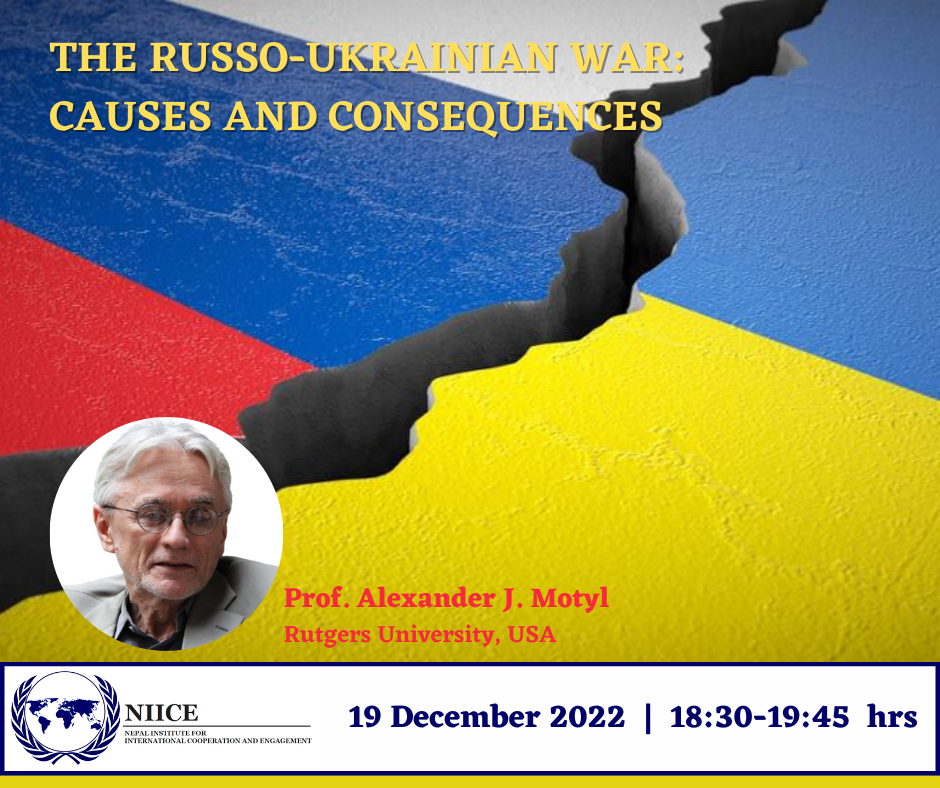
The Russo-Ukrainian War: Causes and Consequences
Watch it on the NIICE Nepal YouTube channel
EVENT REPORT
The ongoing Russia-Ukraine war has evolved into a geopolitical quagmire, captivating the world's attention and inviting numerous questions about its origins, dynamics, and potential repercussions. Professor Alexander Motyl, a renowned expert in Eastern European affairs, recently shared his valuable insights into various facets of the conflict, shedding light on historical nuances, military dynamics, international responses, and the broader global implications. This report aims to distil the key points discussed by Professor Motyl, providing a comprehensive analysis of the complex situation.
Professor Motyl emphasized the historical underpinnings that have contributed to the current state of the Russia-Ukraine relationship. He highlighted the concept of a Russian "sphere of influence," a notion rooted in the Yalta Conference of 1945. This historical perspective, coupled with the collapse of the Soviet Union, has shaped Moscow's perception of its role in the region. Motyl argued that Russia's aggressive posture towards Ukraine goes beyond reacting to external threats, emphasising a subjective perception rooted in concerns about Ukraine challenging its imperial identity.
The discussion delved into the military dimensions of the conflict, highlighting the remarkable resilience of Ukrainian forces in the face of formidable Russian aggression. Professor Motyl acknowledged the substantial support Ukraine has garnered from the West, both in terms of financial aid and military assistance. Over 60 countries participating in the Ramstein process have contributed to Ukraine's defence efforts. Motyl underscored the pivotal role of Ukraine's military strength in shaping the country's post-war landscape, foreseeing a more robust and self-reliant nation emerging from the conflict.
Examining the role of the international community, Motyl discussed the challenges inherent in finding diplomatic solutions. Russia's maximalist demands and the formal annexation of occupied territories have complicated negotiation prospects. The professor stressed the necessity of a Russian defeat as a prerequisite for meaningful diplomatic dialogue. The impact of Russia's actions on global relations was explored, with potential ramifications for established security arrangements.
The Russia-Ukraine conflict extends its influence beyond the immediate region, holding global implications. Motyl argued that Ukraine's successful resistance against Russian aggression could lead to the consolidation of Ukrainian national identity and the fortification of its state institutions. Conversely, Russia's entanglement in the war has raised questions about President Putin's leadership and the stability of the Russian regime. The prospect of Russia undergoing a collapse akin to the Soviet Union was acknowledged, though its likelihood remains uncertain.
The professor also touched upon the impact on other nations, pointing to the delicate diplomatic balancing act that India maintains between Russia and Ukraine. Economic repercussions, particularly in Europe, were discussed, with a focus on potential challenges in energy supply due to strained relations with Russia.
In summary, Professor Alexander’s analysis goes beyond the basic view of the Russia-Ukraine conflict. It's not just about discussing military plans and international power games; it's a call for everyone to rethink how the world works together to stop humanitarian disasters and protect the important principles that keep the world stable.
Prepared by Suraj Sharma, NIICE Intern

Recent Comments